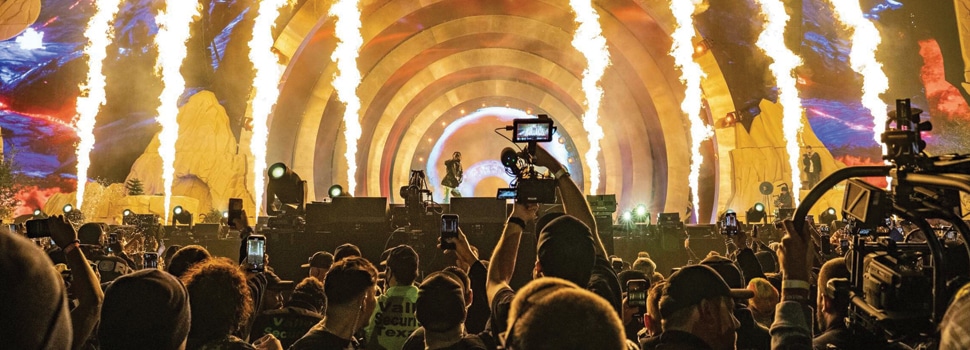Six months have passed since the Astroworld tragedy which resulted in the death of 10 concertgoers and injury of more than 300 – with recent court filings indicating that number may be far higher. But the task of determining what the key conditions at the event were that led to the catastrophe are still uncertain. Each new development regarding the concerns and questions about the safety is followed by silence of the parties involved with the event, but once findings are made, they will likely have a dramatic impact on the future of live events both in Texas and beyond.
The recent Texas Task Force on Concert Safety (TFCS) report cited poor planning, poor security training, and failures in communication at Astroworld. “Unified On-Site Command and Control, Permitting, Training, Planning with Risk Assessment, and Centralized Resources” were highlighted as five themes that needed to be improved. Permitting process here aroused some questions that might be addressed to the authorities of Harris County and NRG Park where the event was held, yet no one but only one official agreed to make an interview, according to click2houston.com.
Believing that “safe gatherings are possible when everyone does their part”, the task force recommended that mass gathering events permitted by municipalities should follow permit guidelines. Local authorities stop the show when it is determined that an event has been organized without a permit or has breached the bounds of the issued permit, the report also recommends. Although NRG Park refuses to comment on the issue due to their respect for pending litigation and ongoing investigations, in their own words; Sam Pena, Houston Police Department Chief, says that NRG is a county property and what goes on in that place is in control of them, adding that the city of Houston has limited jurisdiction at NRG. He concludes, “A special event permit for NRG, that’s not us”. Harris County, on the other hand, states that the Astroworld Festival occurred within the city of Houston and the county lacked any jurisdiction for permitting.
With permitting process on the table, the source of negligence which causes the killing and injury of fans in an organization might seem to shift from companies to local authorities; however, it can also be referred that the latest developments lead to the expanding circle of responsibility. Besides, the agreement details between Live Nation and the NRG Park management are still unknown.
Like NRG Park, Live Nation remains quiet, too. In late December, The House Committee on Oversight and Reform opened an inquiry into Live Nation Entertainment concerning about whether the company took adequate steps to ensure the safety of the 50,000 concertgoers. The Committee asked for an account of what happened at the festival in an open letter. “Live Nation Entertainment (Live Nation) was the concert promoter reportedly responsible for ‘planning, staffing, putting up money, securing permits, finding vendors, communicating with local agencies,’ for Astroworld Festival,” the letter read. Upon company’s request, the hearing for Live Nation CEO Michael Rapino to answer the questions was re-scheduled from January to February, and now it looks like the hearing has been postponed to an indefinite date.
In December, a month after the tragedy, Live Nation Entertainment and its subsidiary Scoremore, Travis Scott, Houston’s Harris County Sports and Convention Corporation (HCSC) all denied responsibility for what happened at the festival in their first responses to the flurry of lawsuits. Denials were followed by the combined lawsuit that was formally approved by the Texas Judicial Panel on Multidistrict Litigation on January 26, and which would reportedly represent nearly 2,800 victims. That consolidation was considered to “promote the expeditious and efficient administration of justice,” and although it was not formed with an aim to assign any blame on the parties, the task force clearly pointed out the failure of the planning, risk assessment, and on-site command within the organization.
While parties maintain their silence about what happened at Astroworld and aftermath, Live Nation has been making its routine announcements regarding concerts, on-sale events, festivals, etc. since the tragedy. The posts related to the tragedy seem to be deleted from the company’s Instagram account (they were kept on its Twitter account, though), which surprisingly acts as if that disaster never happened. Travis Scott, on the other hand, has largely withdrawn from public performance until lately, in April, when he set his first festival dates since Astroworld.
Aside from the ongoing investigations and lawsuits, documentary filmmaker Charlie Minn’s latest film titled Concert Crush: The Travis Scott Festival Tragedy focusing on the chaos at the event made its first screening in Texas on April 29. It was reported by TMZ that the document made Travis Scott’s representatives too furious to call the director a ‘trauma pornographer’. Lawyers for Live Nation, Neal Manne and Kevin Yanowsky, said in a letter that they’re concerned that publicity from the documentary could ‘taint the jury pool’, according to Daily Mail. Charlie Minn said it isn’t a ‘hit piece toward Travis Scott’ whereas the film questions whether others, including Live Nation and Houston police, along with Travis Scott, could have done more to improve safety or respond more quickly to the danger. Scott, Live Nation and Houston police were told to decline to be interviewed for the documentary, according to the same report.



